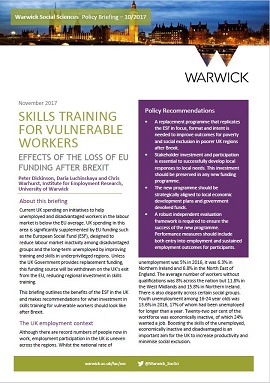Mind the Gap - how will skills training be funded after Brexit?
 Skills training for vulnerable workers: effects of the loss of EU funding after Brexit outlines how current skills training in the UK is supported by EU funding, and recommends key priorities for a post-Brexit UK-funded skills programme
Skills training for vulnerable workers: effects of the loss of EU funding after Brexit outlines how current skills training in the UK is supported by EU funding, and recommends key priorities for a post-Brexit UK-funded skills programme- The paper is the third of four Warwick Brexit Briefings on Employment by the University of Warwick and its Connecting Research on Employment and Work (CREW) network.
- Through the European Social Fund (ESF), the EU provides around £4.5 billion to support unemployed and economically inactive people into work.
- ESF funding fills in gaps and complements UK Government programmes, targeting the poorest UK regions and the most vulnerable workers in the UK.
- The Government has committed to fund existing programmes only until 2020.
The University of Warwick has published the third in a series of briefings exploring the implications of Brexit for the job market, workers’ rights, and employment policy.
Skills training for vulnerable workers: effects of the loss of EU funding after Brexit warns that when the UK leaves the EU, £4.5bn of funding for local training and skills support programmes will be lost unless the UK Government replaces the money currently provided by the European Social Fund (ESF).
The briefing, by Peter Dickinson, Dr Daria Luchinskaya, and Professor Chris Warhurst of the University of Warwick’s Institute of Employment Research, finds that although the UK is approaching full employment, economic participation is unevenly distributed both across the regions and in different social groups. Northern Ireland and the North East have higher than average unemployment, while unemployment among young people from 16 to 24 is 13.6 per cent, more than twice the average national rate.
State-funded programmes play an important role in equipping hard-to-help groups with the skills needed to gain sustainable employment. Through the European Social Fund (ESF), the EU provides around £4.5 billion to support unemployed and economically inactive people into work.
ESF-supported programmes are particularly valuable as they are targeted at the UK’s poorer regions, developed in partnerships with local stakeholders, and complement existing Government initiatives. The IER team evaluated the success of ESF-funded programmes running between 2007 - 2013 and found that hard-to-reach groups had been helped and capacity had been built at the local level.
Peter Dickinson said: “An unheralded consequence of the Brexit vote is the end of European Social Funding, and the support it provides for many of the most disadvantaged people across the UK. If support is not continued after 2020, key programmes for people not covered by Government funding will finish.”
Co-author Dr Daria Luchinskaya added: “While the UK government guarantee for ESF-funded projects to 2020 is welcome, more clarity is needed about what kind of system will replace it afterwards. Guaranteeing the funding is also just one part of the issue: it is as important to maintain the redistributive design of the funds to ensure support is targeted where it is most needed.”
The Warwick Brexit Briefings on Employment are designed to help policymakers navigate the challenge of disentangling UK and EU employment regulation, and designing a wholly new UK system.
The briefing papers are presented to an invited audience of parliamentarians, employment organisations and other stakeholders in Westminster each week between now and 7 December, and will be free to download from the CREW website.
27 November 2017
- Click here to download a copy of Skills training for vulnerable workers: effects of the loss of EU funding after Brexit
Contact:
Sheila Kiggins,
Media Relations Manager, Social Science
+44 (0) 7876 218166
+44 (0) 2476 150 423
s.kiggins@warwick.ac.uk
Click HERE to download the brief.
